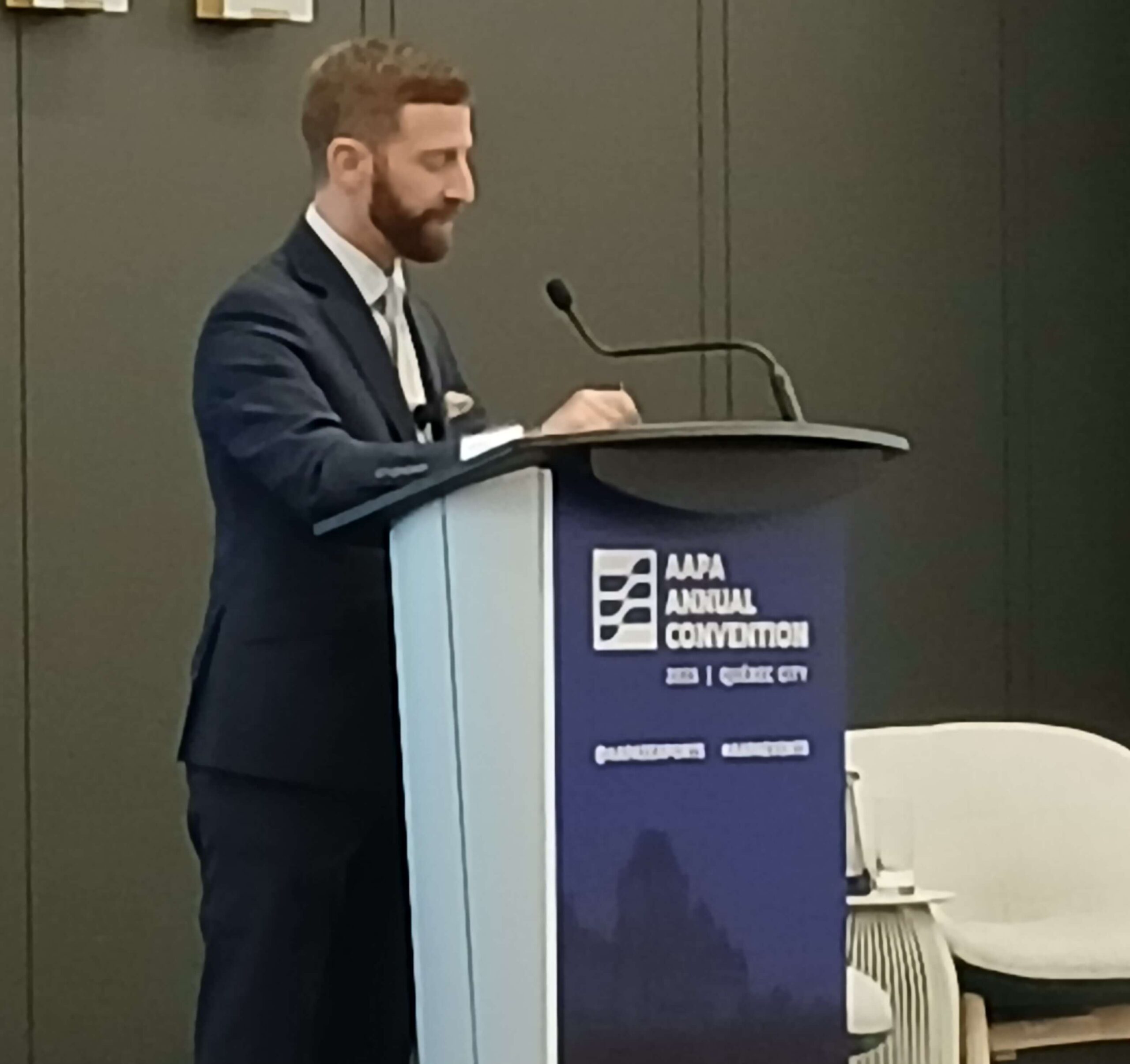The American Association of Port Authorities, representing 130 public port authorities, mostly in the United States, but with Canadian ports in Vancouver, Montreal, Halifax, Saint John, N.B., Québec City and Prince Rupert, B.C., is holding its annual convention in Québec City.
“Québec City is not the most obvious venue to hold this convention,” said AAPA president and CEO Cary Davis in his opening remarks, before noting that Prime Minister Mark Carney is due to meet U.S. President Donald Trump to talk about trade issues.
Mr. Davis suggested Mr. Carney should avoid conflicts with Trump, adopting “grace and understanding,” as he introduced Derek Cutter, the AAPA’s chief economist, who admitted these are “interesting times.”
“Tariffs are re-shaping, changing the next economic growth,” Mr. Cutter said, and having an impact on logistics and manufacturing.
“There’s a lot going on,” he said, affecting consumption patterns and investment. “It’s not looking great,” he added. “But we’re still OK. There is a path forward.”
The U.S. bond market is holding on and the latest Moody’s Forecast projects average yearly growth in the U.S. for the coming 25 years at 2%, he said, with Southern California, Arizona, Texas and Florida showing “a lot of growth potential.”
Driving that growth is services, notably health and education, but also projected is 40% growth in freight. “That’s significant.” And so is rising Foreign Direct Investment.
“It’s new people coming in,” Mr. Cutter said, citing information technology, professional services and manufacturing, with those FDI investors from Asia, Europe and Canada, drawn by proximity to the U.S. market.
As well the U.S. has “a very skilled workforce.”
Mr. Cutter said that while surprisingly to date Trump’s sharp increase in tariffs “has not led to that much disruption, it’s the new normal.”
“This is a one-time shift,” he said. “We can work around it.”
As for Trump’s stated goal of bringing back to the U.S. manufacturing, a barrier is the “staggering cost of labour,” compared with offshore markets, noting that while imports from China are being hit, low-cost India is picking the slack.
New manufacturing in the U.S., therefore, would be in activities that can be automated, are high value, with low labour content.
“If you bring that back and it is too expensive, we could have some problems,” Mr. Cutter said.
As well, even before Trump began rolling out tariffs, there was more diversity in supply chains, and as that changes, ports must adapt.
Mr. Cutter said container vessels are getting “larger and larger” with more boxes on board and are abandoning intermediate stops, meaning their destination ports, usually surrounded by natural markets, must prepare.
In the AAPA’s legislative update, John Bessler, the AAPA’s vice-president, government relations, said the Republican trifecta, control of the Oval Office, the House of Representatives and Senate, is “just fine for us” because the AAPA has good relations with both Republicans and Democrats.
“We push back when we need to,” he added.
Ian Gansler, director of government relations, said the AAPA favours renewal of the Biden administration’s surface transportation infrastructure program, as well as new port funding.
The AAPA is pushing for a $10.9 billion port envelope, knowing with the current Congress being “fiscally conservative” that is “less likely,” but it is sticking to its guns.
AAPA is “proudly free trade”
“You never know what the president is going to ask for,” Mr. Gansler said.
Shawn Balcomb, AAPA public affairs director, said the AAPA will give the Trump administration credit when it is deserved. “We want to be strategic and smart.”
But the AAPA is “proudly free trade,” Mr. Balcomb stressed, adding that “ports exist because of imports and exports.”
An AAPA official in the audience, who declined to be identified for this article, said he is in contact with Republican Congress members and U.S. Trade Representative officials who recognize the tariffs are harmful. “They are killing us.”
But he is “baffled” those same people are not willing to bring that message to the Trump administration.

(Photo by Kevin Dougherty of Cary Davis and Dreamstime photo of Québec City)


